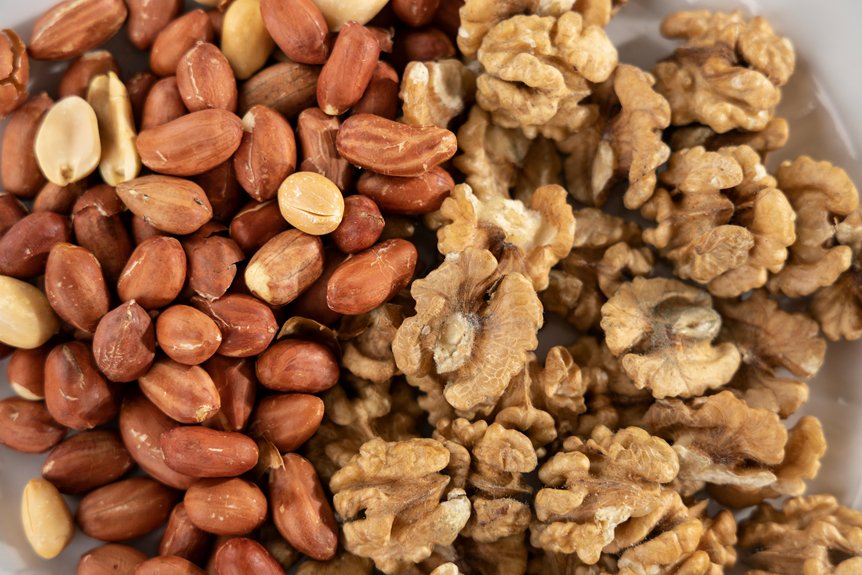
Did you know that extra virgin olive oil is not just a flavorful addition to your meals but also a notable source of vitamin K? With around 60 micrograms of this essential nutrient per 100 grams, it plays a significant role in supporting your body’s functions. But how does this oil stack up nutritionally, and what other benefits does it offer? Let’s explore its unique profile and the health advantages it brings.
Understanding Vitamin K: Importance and Functions
Vitamin K plays an essential role in your overall health, serving as a key player in blood coagulation and bone metabolism. This vitamin helps activate proteins that are significant for clotting, preventing excessive bleeding when injuries occur. Your bones also benefit, as Vitamin K supports calcium regulation, promoting bone strength and reducing fracture risk. It’s particularly important for those seeking liberation from chronic health issues, as adequate levels can improve your overall vitality. Green leafy vegetables, fermented foods, and yes, extra virgin olive oil, can help you meet your daily needs. By understanding the importance of Vitamin K, you empower yourself to make informed choices that enhance your well-being and foster a healthier lifestyle. Embrace this knowledge, and take control of your health! Additionally, incorporating high-quality olive oil, such as Gundry MD Olive Oil, can provide beneficial polyphenols that further support your health.
Nutritional Profile of Extra Virgin Olive Oil
While exploring the nutritional profile of extra virgin olive oil, you’ll discover a treasure trove of health benefits packed into this golden liquid. It’s not just a flavorful addition to your meals; it’s a powerful ally for your well-being. Here are three key components that make it a must-have in your kitchen:
- Healthy Fats: Extra virgin olive oil is rich in monounsaturated fats, which support heart health and reduce bad cholesterol levels.
- Antioxidants: Packed with antioxidants like oleocanthal, it helps combat inflammation and protect your cells from damage.
- Vitamins: It contains essential vitamins, including E and K, which play crucial roles in maintaining your overall health.
Incorporating this liquid gold into your diet can lead to a healthier lifestyle.
Vitamin K Content in Extra Virgin Olive Oil
When it comes to the nutritional benefits of extra virgin olive oil, the presence of vitamin K stands out as a significant advantage. This oil contains approximately 60 micrograms of vitamin K per 100 grams, making it a decent source for those looking to boost their intake. Vitamin K plays a vital role in blood clotting and bone health, which are essential for maintaining your body’s functionality. By incorporating extra virgin olive oil into your diet, you not only enhance flavors but also support your overall nutritional goals. Remember, while it’s beneficial, it shouldn’t be your sole source of vitamin K. Diversifying your diet guarantees you get a well-rounded intake of nutrients for peak health and freedom.
Health Benefits of Extra Virgin Olive Oil
Extra virgin olive oil offers a wealth of health benefits that go beyond its delightful flavor. By incorporating it into your diet, you can enjoy numerous advantages:
- Rich in Antioxidants: It contains powerful antioxidants that combat oxidative stress, helping to protect your cells.
- Heart Health: Regular consumption may lower the risk of heart disease, thanks to its ability to reduce bad cholesterol levels and inflammation.
- Anti-Inflammatory Properties: The oleocanthal present in extra virgin olive oil acts similarly to ibuprofen, reducing inflammation in your body.
Embracing extra virgin olive oil isn’t just about taste; it’s about enhancing your well-being. By choosing this healthy fat, you’re liberating yourself from unhealthy alternatives and nourishing your body with essential nutrients.
Incorporating Extra Virgin Olive Oil Into Your Diet
Incorporating extra virgin olive oil into your diet can be both simple and enjoyable, as it seamlessly enhances a variety of dishes. Drizzle it over salads for a burst of flavor, or use it as a base for marinades and dressings. You can also sauté vegetables or grill meats with this heart-healthy oil, adding depth to your meals.
For a unique twist, try dipping fresh bread in flavored olive oil, or add it to pasta dishes for richness. Remember, the key is to use high-quality extra virgin olive oil, which retains more nutrients and antioxidants. By making it a staple in your kitchen, you’ll not only elevate your culinary creations but also embrace a healthier lifestyle.





